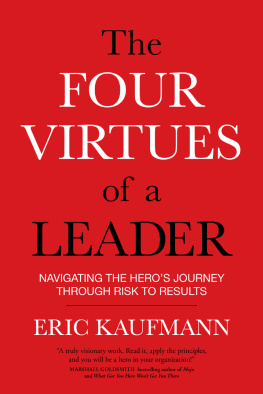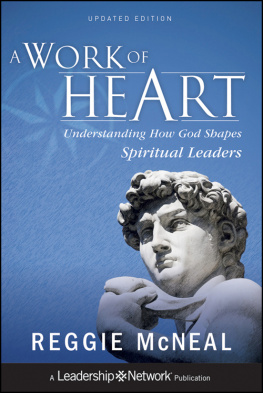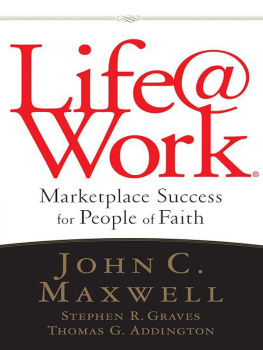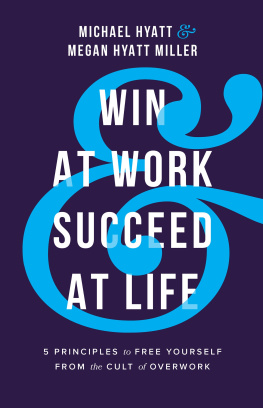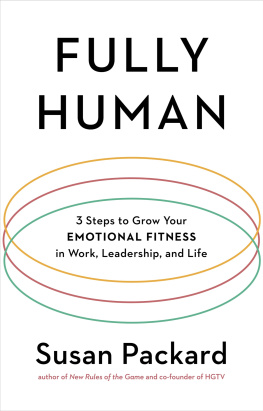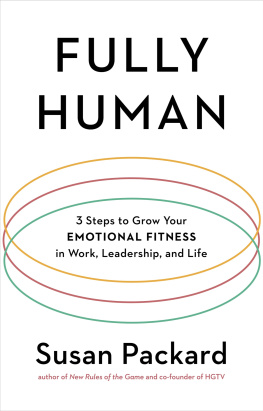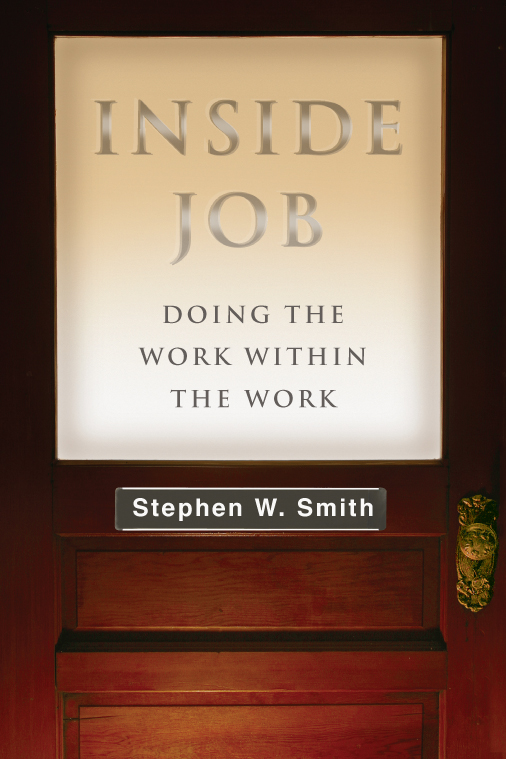So that we would never forget!
Contents
Part One
The Crisis in the Leaders Soul
Long ago a Chinese man began his career making bell stands for the huge bronze bells that hung in Buddhist temples. This man became prized and celebrated for making the best, most elaborate and enduring bell stands in the entire region. No other person could make the bell stands with such strength and beauty. His reputation grew vast and his skill was in high demand. One day the celebrated woodcarver was asked, Please tell us the secret of your success! He replied:
Long before I start making and carving the bell stand, I go into the forest to do the work before the work. I look at all of the hundreds of trees to find the ideal treealready formed by God to become a bell stand. I look for the boughs of the tree to be massive, strong and already shaped. It takes a long time to find the right tree. But without doing the work before the work, I could not do what I have accomplished.
1
Life Is More Than Chasing Success
T he ground at the foot of the ladder of success is littered with the names, faces and stories of leaders who self-destructed on the way up. Unless youve been living under a rock, you know their names and faces. Youve seen them interviewed by nightly news anchors, youve read the scandalous articles online, and youve possibly thought, But that could never happen to me.
According to the Harvard Business Review, two out of five new CEOs fail in their first eighteen months on the job. It appears that the major reason for the failure has nothing to do with competence or knowledge or experience, but rather with hubris and ego. In other words, they thought, But that could never happen to me.
Im here to tell you that it can happen to you. And if by some stretch of the imagination you believe youre immune to a crash-and-burn because of your faith in God, then youre living with the exact kind of naivet that can ruin your reputation, your family, your health and your legacy. Your name can be added to that ever-growing pile at the bottom of the ladder of success. In my work with hundreds of leaders from across the world, I find that far too many have eagerly entered the workplace, marketplace or mission field with the goal of establishing themselves and striving toward a successful future. But unfortunately they overlooked something crucial along the way. They end up in my office soaked in tears and shame because they were fired for ethical violations, they didnt know how to work on a team, or they even succumbed to the dark allure of money, sex and power. At one time they thought, But that could never happen to me. But it did.
The obvious question here is, why? Ill offer my take. But I warn you, the answer is not pretty.
Dirty Little Secret
We can prostitute our very souls in our attempts to be successful. We can sell out, cave in and go morally bankrupt chasing the god of success. Knowing this perilous potential, Jesus himself warns us that we can lose our souls by too much gaining, saying, What kind of deal is it to get everything you want but lose yourself? What could you ever trade your soul for? (Matthew 16:26). It is no deal at all to lose our soul in striving after the goddess of success. In doing so we pay the ultimate pricea price we do not, in fact, need to pay.
Thats strong language. Success as the world defines it has become a god to us. Yet the first of the Ten Commandments is You shall have no other gods before me. We may not have put success before the Lord God, but weve sure put it alongside him. Moses feared success for his people more than he feared a life in the wilderness. He warned his people of its dangers:
Make sure you dont forget G OD , your God, by not keeping his commandments, his rules and regulations that I command you today. Make sure that when you eat and are satisfied, build pleasant houses and settle in, see your herds and flocks flourish and more and more money come in, watch your standard of living going up and upmake sure you dont become so full of yourself and your things that you forget G OD , your God,
the God who delivered you from Egyptian slavery;
the God who led you through that huge and fearsome wilderness,
those desolate, arid badlands crawling with fiery snakes and scorpions;
the God who gave you water gushing from hard rock;
the God who gave you manna to eat in the wilderness, something your ancestors had never heard of, in order to give you a taste of the hard life, to test you so that you would be prepared to live well in the days ahead of you.
If you start thinking to yourselves, I did all this. And all by myself. Im rich. Its all mine!well, think again. Remember that G OD , your God, gave you the strength to produce all this wealth so as to confirm the covenant that he promised to your ancestorsas it is today. (Deuteronomy 8:11-18)
Have you ever thought some of those things to yourselfthose phrases that are the whisperings of success?
I did it all, all by myself.
Look at what I have become.
Its all mine.
J. B. Phillips was a successful pastor and prolific author in the mid-twentieth century. He was a colleague and friend of C. S. Lewiss, and it was Lewis who personally endorsed Phillipss translation of the Bible into everyday language for modern readers. His books sold into the millions and are still popular today. Phillipss legendary success established him as a leading voice in the work of the church all around the world. But in Phillipss autobiography, The Price of Success, he personally laments the great cost of his worldly success. He writes:
I was in a state of some excitement throughout 1955. My work was intrinsically exciting. My health was excellent; my future prospects were rosier than my wildest dreams could suggest; applause, honor and appreciation met me everywhere I went. I was well aware of the dangers of sudden wealth and took some severe measures to make sure that, although comfortable, I should never be rich. I was not nearly so aware of the dangers of success. The subtle corrosion of character, the unconscious changing of values and the secret monstrous growth of a vastly inflated idea of myself seeped slowly into me. Vaguely I was aware of this and, like some frightful parody of St. Augustine, I prayed, Lord, make me humble, but not yet. I can still savor the sweet and gorgeous taste of it all: the warm admiration, the sense of power, of overwhelming ability, of boundless energy and never-failing enthusiasm. It is very plain to me now why my one-man kingdom of power and glory had to stop.
A one-man or one-woman kingdom of power and glorythats the danger. Thats the kind of success that leads us to forget who is behind any strength and wealth we have achieved. As we will explore in this book, whats at stake in our success is the subtle corrosion of character, the unconscious changing of values and the secret monstrous growth of a vastly inflated idea of myself. Its not that success is inherently wrong. Its that we have allowed it to rival God and God will share his worship with no one and no thing. God is a jealous God. And we have become unfaithful spouses.
But guess what? It doesnt have to be that way.
Heres the good news. We can climb that ladder of success to live and finish well. Now does this indicate were going to have to define exactly what success and finishing well mean? Yes, and thats a part of what this book is about. In fact, much of what is presented here will be a redefinition of such words and phrases. We tend to form our definitions of success and happiness by the world around us. We begin with childish ways of demonstrating successthe one with the most toys winsand this attitude carries forward in life as we age, acquire more power and increase the size of the shadow we cast amongst all the other trees in the forest. But here, childish ways must be put aside. And as we put aside childish definitions of success, we will be challenged to form a more virtuous, precise and life-guiding understanding of not only success but also inner contentment and deep satisfaction.


